I grew up in the church. I was one of those kids that was there every time the church doors were open – involved in traveling youth ministry, helping in Vacation Bible School, singing in choir, memorizing Bible verses… I loved being at the church. You get the idea.
But you know what I was missing despite my firm faith and solid foundation and familial support?
The habit of actively pursuing God and the knowledge of how to do it.
My Gram bought all of us hard-cover devotional books every year, put out by Guideposts and designed to give you a devotion per day. I also had subscribed to the little booklets they would mail out every so often with daily devotions called “Daily Bread”.
But, I didn’t read many of them.
I’d start out on a good foot and read for a few days, then I’d forget or get busy and that was that. I’ve found out now that it’s very difficult to grow as a Christian and in your relationship with God by merely showing up to church on Sunday. In fact, I’m ashamed to say that later, for part of my life, I wandered away from learning and being in the church entirely. I prayed, but that was about it.
Study is an important part of your relationship with God. Now, it is of course optional. Our faith teaches that we are saved through Faith, Grace, and Christ and nothing of our own works. (Ephesians 2:8-9). However, study helps that faith and it also helps you take steps toward what we are called to in the Great Commission.
There are 4 steps to my routine, but first, you’ll need to gather the tools.
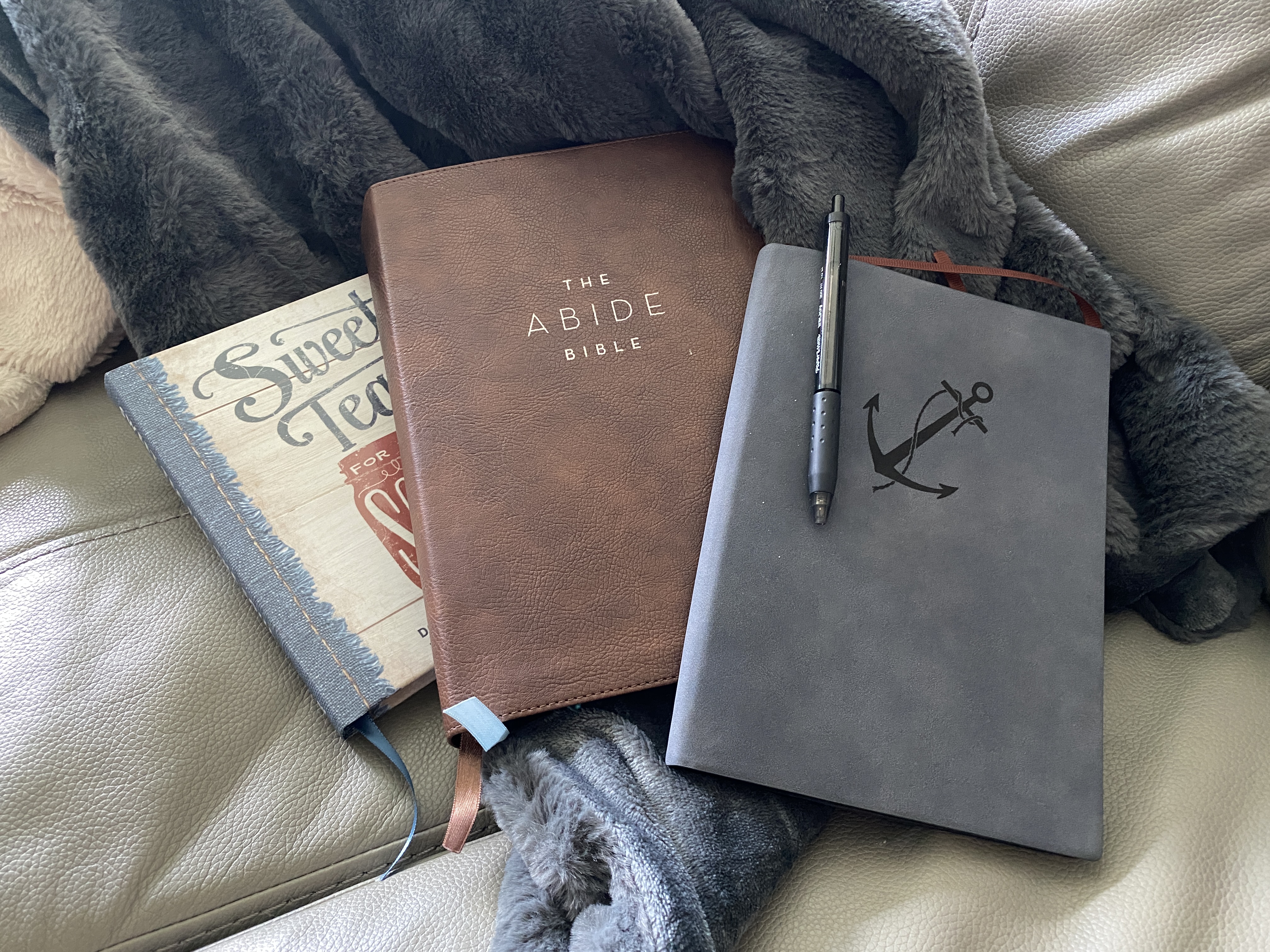
Here’s What to Do First:
1. Getting a Bible that Helps you Grow and Understand.
It wasn’t until I was over 40 and married to a man actively pursuing God that I developed a routine that actually stuck and it was super easy, doesn’t take long, and feels productive. It started when he showed me a Bible that he’d discovered – the Abide Bible. They sell it in hardcover and softcover.
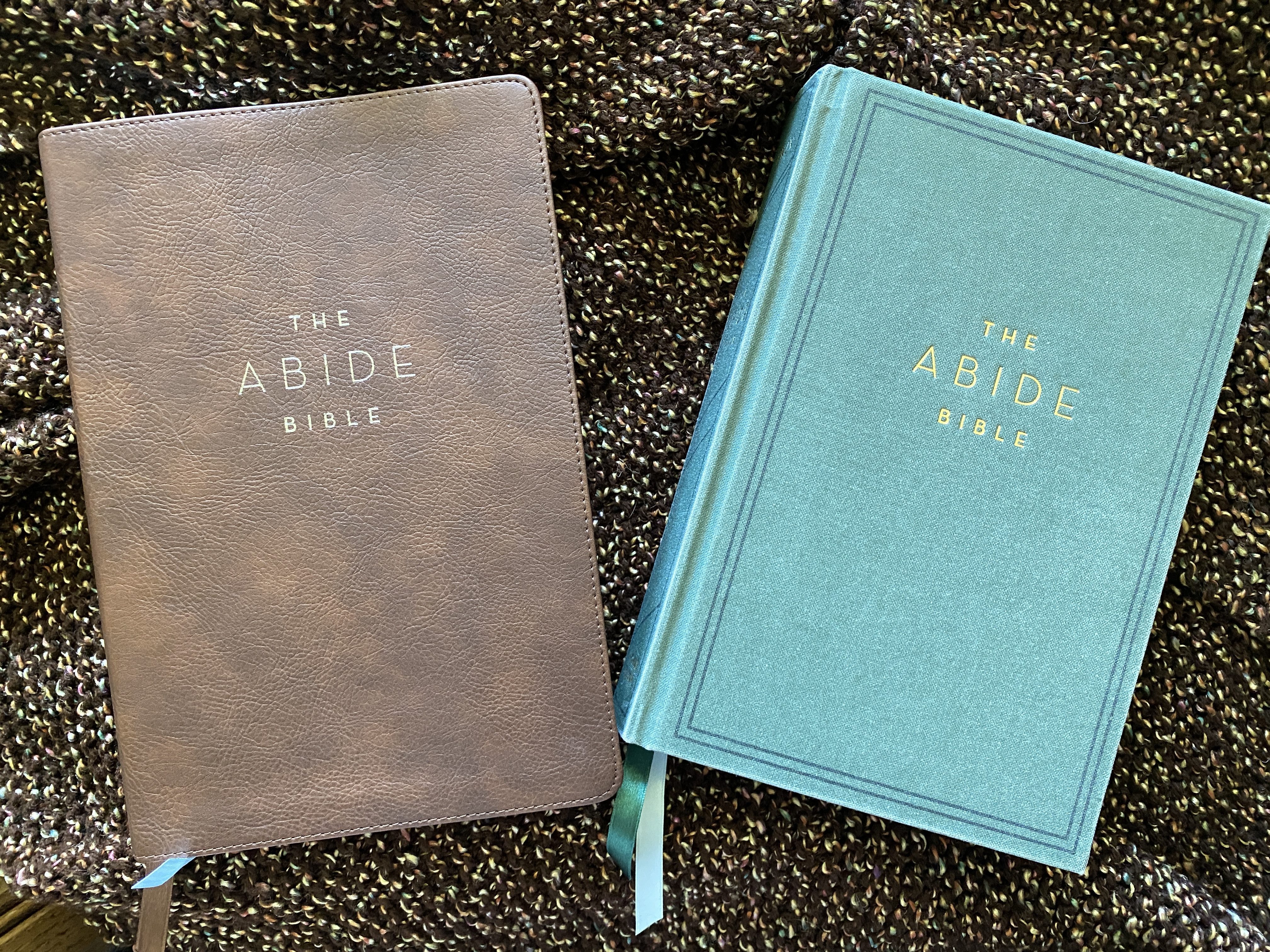
I have the softcover and just love it. My husband has the hardcover. A pdf is available for free too!
If you look around on Christian Bookstore, they also have some companion books if you’re interested. The Abide Bible is available in several versions if you don’t like NKJV, but it is designed in a way to actually help you study the bible. You can learn more about this bible here.
And more about it here, including the links to the free pdf.
That’s what kicked off my routine – obtaining this bible. It is a fantastic supportive tool.
2. Obtain Two More “Books”
The other two books that you need are a devotion book and a notebook. It doesn’t have to be any specific one or type.
Your notebook can be fancy or plain. I bought a pack of faux suede-bound journals because they feel good in my hand and I know that I’m more likely to use something that feels nice. But, you can just use a plain composition book that usually costs under a dollar or a fancy leather-bound journal. The important thing is to find something you will actually use. Whatever feels good to you.
You can use a digital journal if you are more comfortable, but I find a tangible journal keeps most people on track better (more on that below).
For my current devotion book, I bought the “Sweet Tea for the Soul” series because I found it to be inspirational, and humorous, and there’s a lot of nice quotes throughout. Not all of the entries are “hits” but overall I enjoy the book and that is key to choosing a devotional. You have to actually like it. If the stories inside do not move you, inform, or entertain you – if they are just blah, blah, blah – then you aren’t going to get much from reading it and you’ll feel like it’s a chore to do your devotions. That makes it easy for the habit to fall off. We don’t want that.
While all things concerning the Lord are good, that does not mean that all devotionals fit all people. But there is one out there that will be a joy for you. You just have to look.
Obviously, you want devotions that are biblical – that’s the point. But, you also have to give yourself some slack and find some that aren’t going to make you look for a reason to get out of them. There are many, many types out there!
3. Consider Companion Books
Are there specific people that you want to pray for? Or do you just need help in your prayers? There are a plethora of books out there that can help deepen your prayer relationship with God, just by helping you learn more about praying. For me, I love these two:
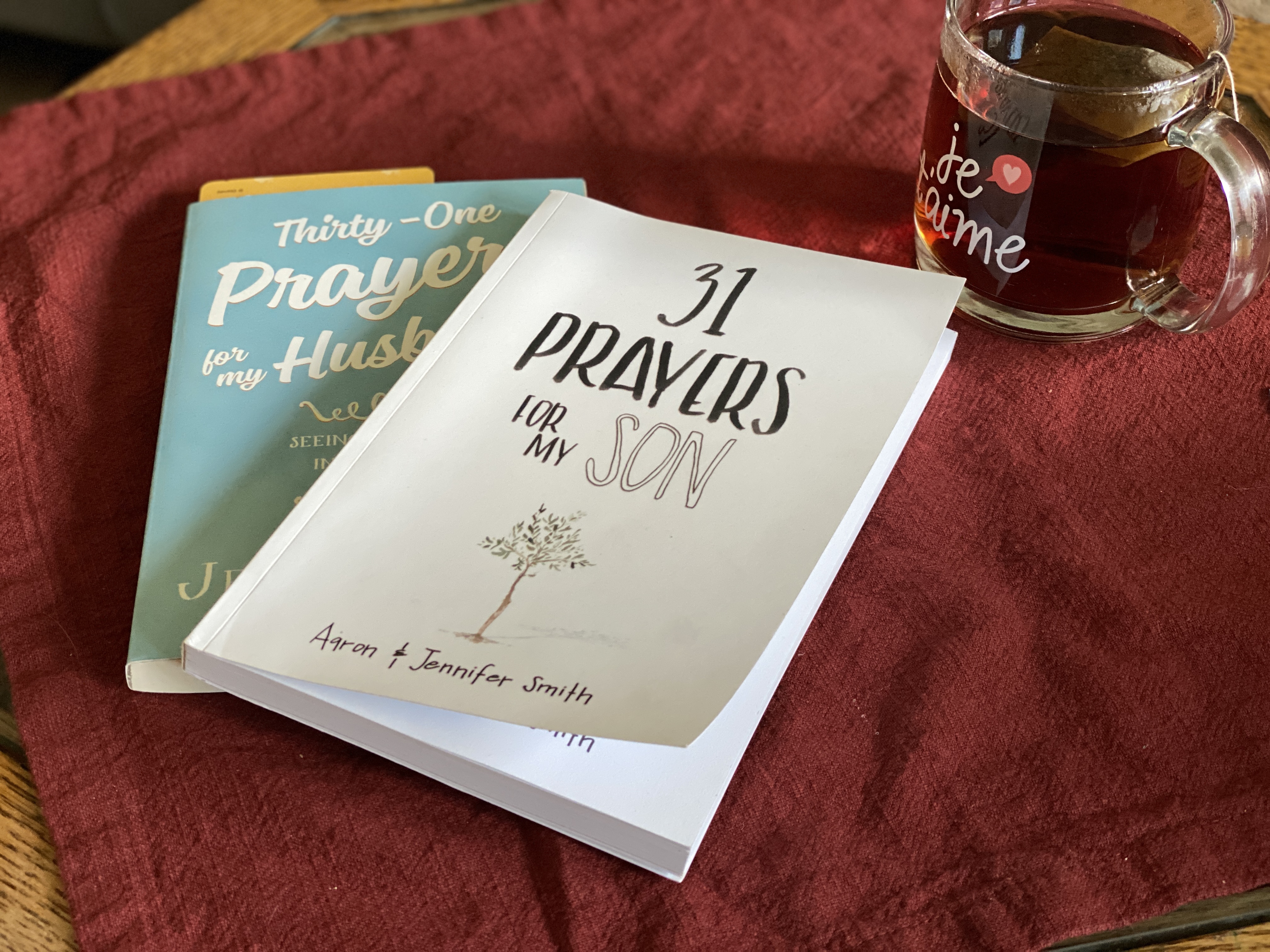
I like to use books like these because they are just simple prayers that are not self-motivated but are designed to help you lift up your loved ones in prayer while giving you the words to say, which believe it or not I struggle with sometimes! They aren’t “how-to” books, but actual prayers. I’ve been praying for almost 50 years and these gave me more words and aspects to pray about in the lives of my loved ones than I’ve ever thought of on my own.
The Routine
Some people like to pray before their devotions. It’s ok if you do or you don’t to start, but I strongly recommend that you pray at some point during the devotions (before, during, or after) because I mean, after all, our conversations with God are a big part of our relationship with Him!
Secondly, get yourself comfortable. Sit in the cozy chair with the soft blanket. Sit outside on your porch in nature. Get your coffee or tea or even a little pastry. Get cozy with God! This is a joyful, comforting, spiritual relationship time. Make it special.
It’s best if you can do this during a quiet time on your own. Even if it’s just sitting quietly next to your baby while he sleeps.
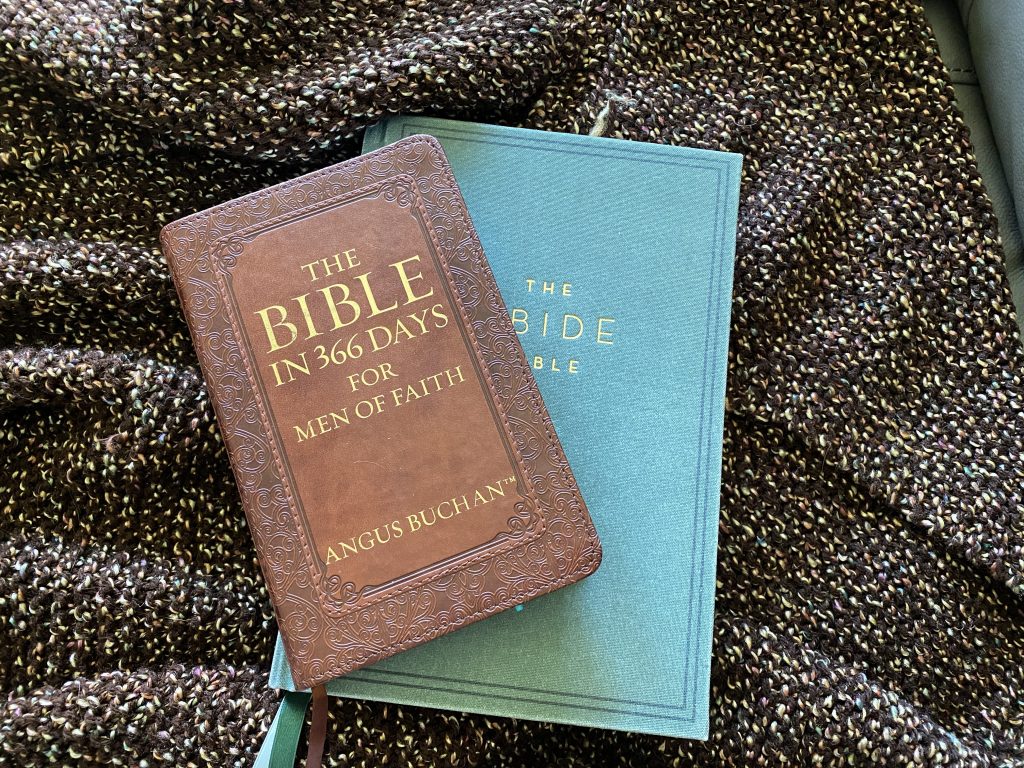
1. Read your Devotional
The devotional is the starting point. It points you in a direction, takes about 3-5 minutes to read, and gives you something to think about and reflect on.
Here are some tips for using your devotional:
- I found that the scripture verbiage is drastically different in some areas of the bible when you are using a different version and this is quite evident when you are looking at devotionals sometimes. Don’t let that hang you up!
- You may not specifically agree with one of the devotions in your book. Again, don’t let it stick in your craw. We only use the devotional as a starting place.
- If you find your devotions too boring or really offend you, go get a different book. There are some great ones out there that will fit your taste.
Now that you’ve finished that read, pick up your Bible.
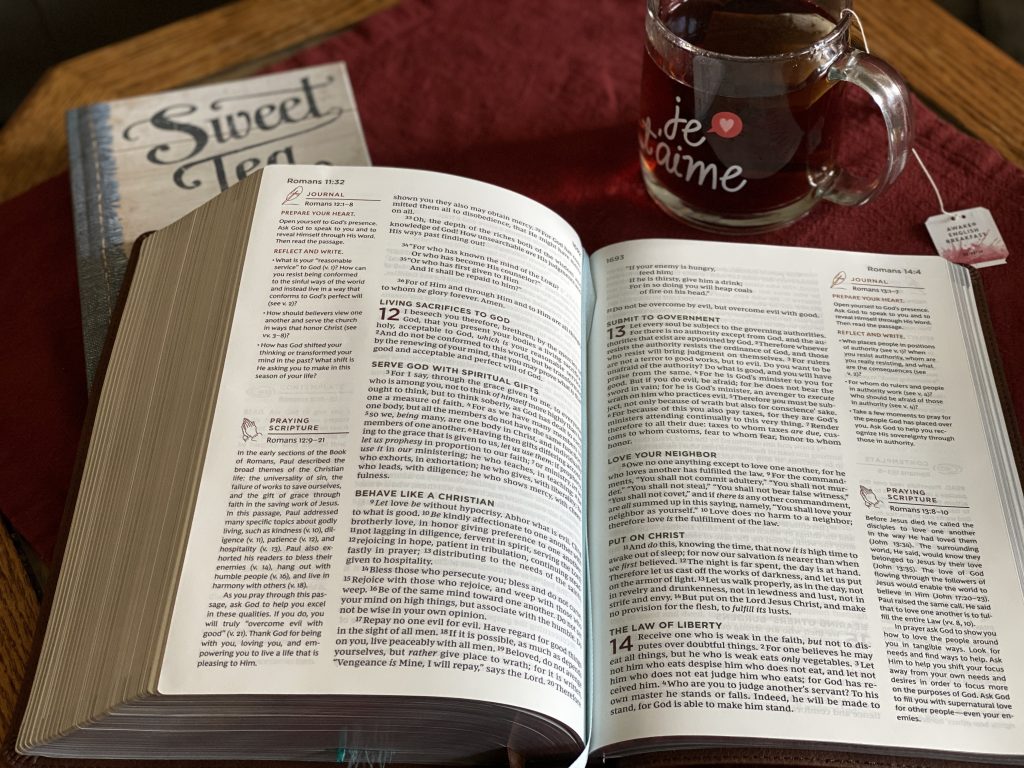
2. Look Up the Scripture
This is the meat and potatoes of the routine and obviously the center of our studies. Look up the scripture that was in your devotions. Now an important note on that:
There are times I’ve looked at the scripture in the devotional and went to look it up and got distracted by another scripture along the way. That’s ok! That’s likely what you were meant to ponder.
But, let’s assume you didn’t get distracted by something the Holy Spirit called your attention to and you made it to the verse in your devotions.
- Read the verse.
- Now, read the text around the verse and put it into context to make sure that you understand it a little more.
- Look at the notes on the side of your bible and see if there is any supporting information provided there that you should consider. In the Abide bible, sometimes there will be a reference to another teaching or some historical information to ponder or even thought-provoking questions.
- It helps your retention to read the verses aloud if you are able to.
Pray. It doesn’t have to be a long prayer. It can be, but it can also be a “Father, please lead my thoughts to what you want me to see here.”
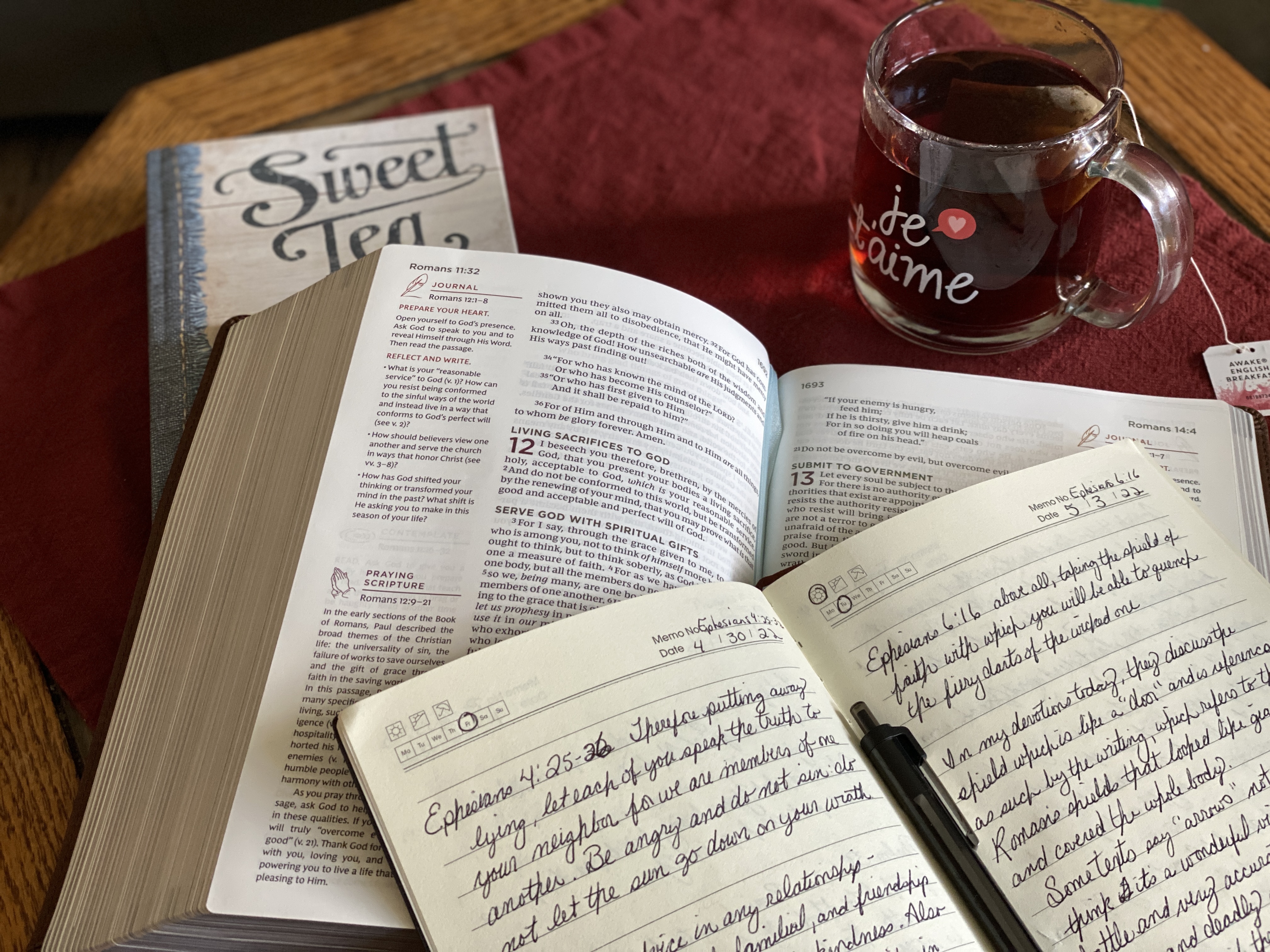
3. Journal
Some people don’t find this part necessary, but tactile exercises are an important part of any type of learning, memorization, and understanding. This helps you grow.
Your journal might look different than mine. But, what I like to do is write out the verse at the top – even if it’s the verse that I got distracted by – and then write out my thoughts about the verse.
Here are some ideas. Pick one or many or none, they are just inspiration:
- What did it bring to mind in your own life?
- What thoughts came to you as you read your devotions and the scripture?
- Did this verse bring up any questions that you’d like to research further? (I like to star these so I know to go back.)
- Are there any corresponding verses suggested? Add them if you like.
- Things your devotions mentioned and what you thought about them
- Feelings evoked from the scripture
- Convictions evoked from the scripture
- Historical references that you are aware of that tie into the scripture
- Happenings in media that relate to the verses
- Happenings in those around you that come to mind from the verses
- Prayers that come to mind
- What would you say to your future self (or your child or other loved one) if they were reading your journal notes?
- What would you say if you were teaching about your readings today?
Final Tips:
- Your studies might make you feel led to continue your research – make the time to do it!
- If you are married, ask your husband to start this routine with you. If you aren’t, ask a child, family member, friend – anyone!
- If your “study partner” is living with you, then it helps keep you both on track by seeing the other do it if you miss a devotional time.
- If your “study partner” is not living with you, maybe you can use the same devotional and talk about it together.
- My husband and I use different devotionals, but it often prompts us to take to each other a new discovery or thought which prompts great conversation and growth.
- If you are an audible learner, I do have the bible recorded into daily reads here.
Now, I want to leave you with one final thought. Studies have been done on memory retention for decades and as a professional teacher of adults, I’ve studied it quite a bit. There is a thing called the Cone of Learning. Here are a couple of diagrams on the subject:
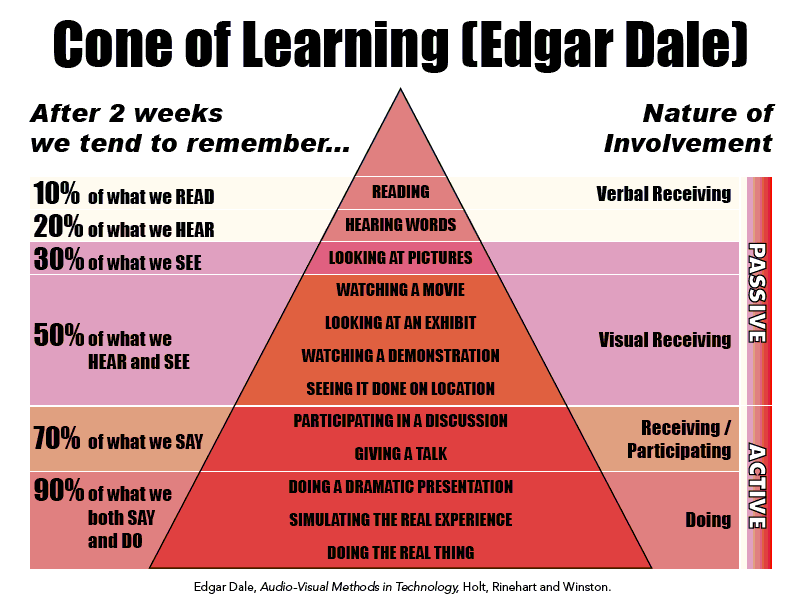
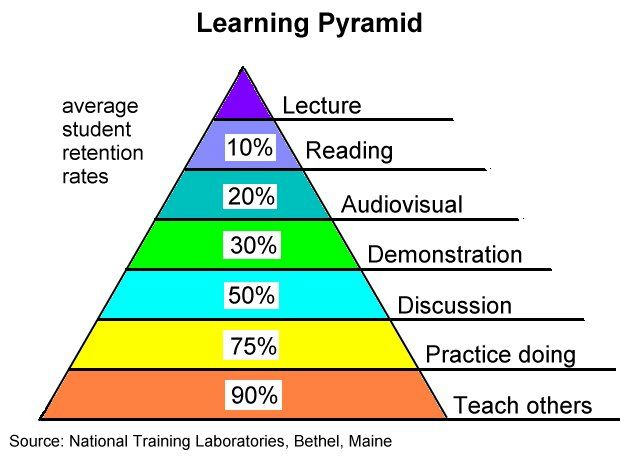
Also, those aren’t affiliate links, in case you wondered 🙂 . While I do add them on some articles, these are to a bookstore that I heartily love and wouldn’t want to ask them to pay me to bring them business because I believe they serve a good and much-needed purpose.